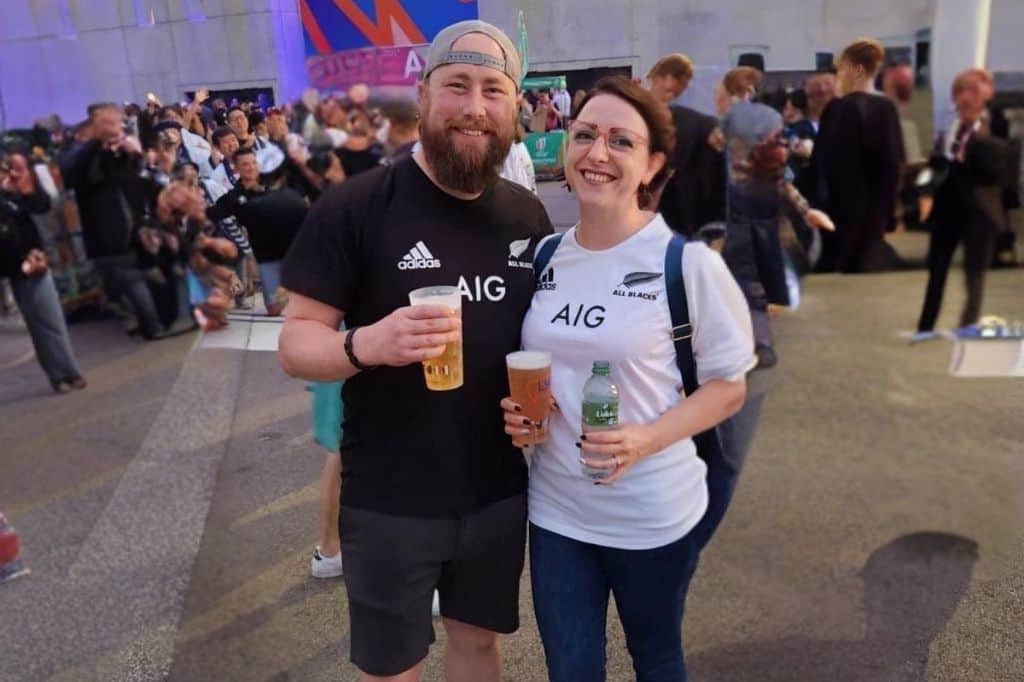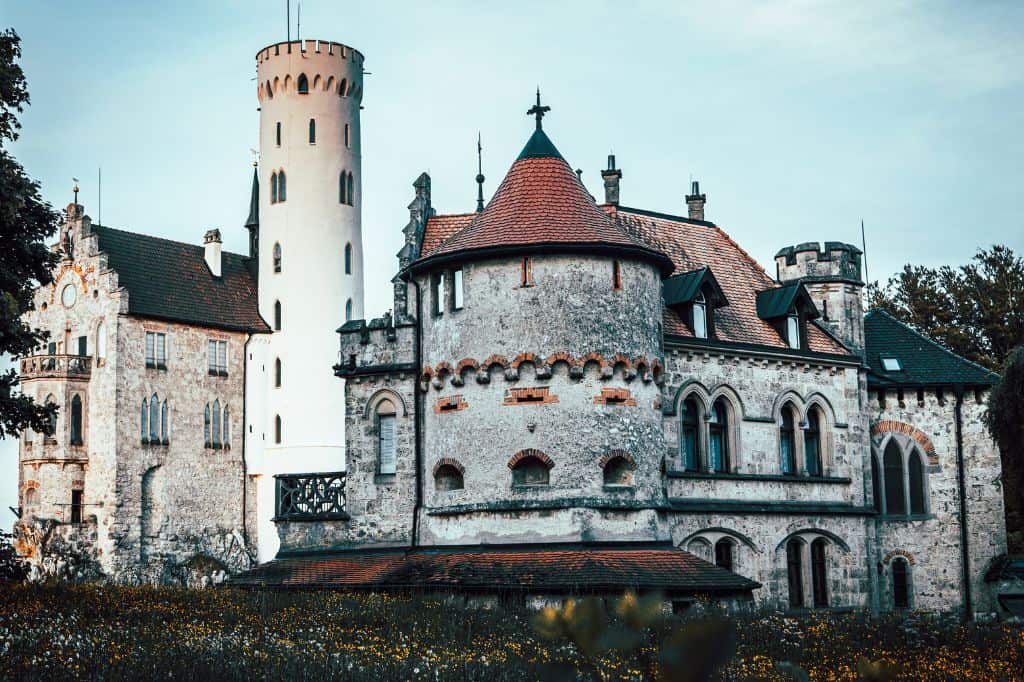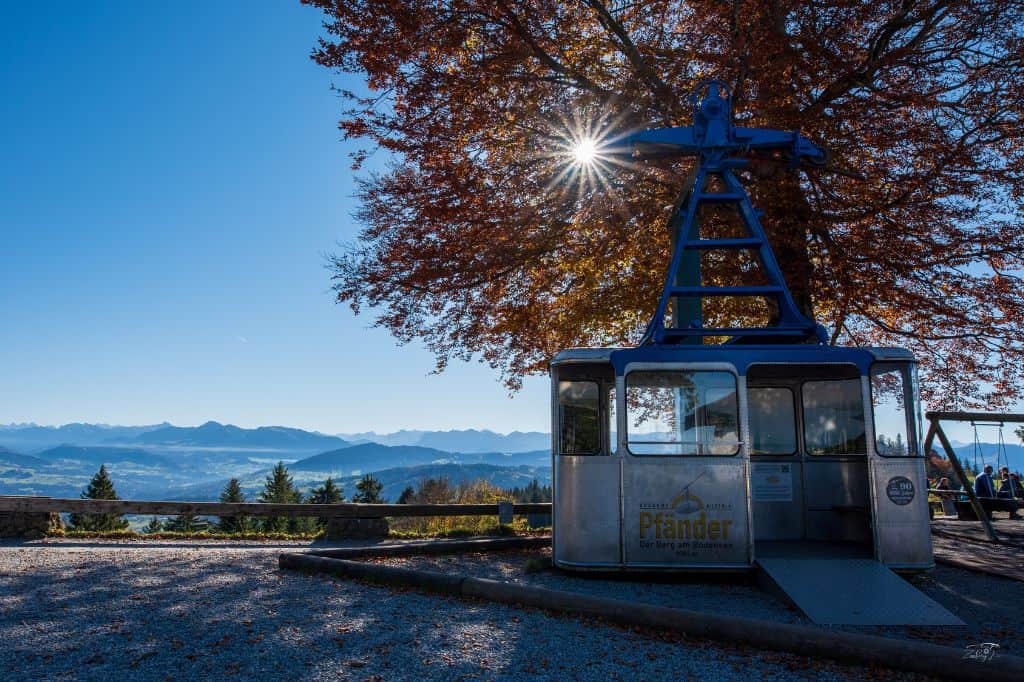
What’s it like to leave the military and build a life and career in another country? After leaving the U.S. Air Force in 2018, Zak Kee found a new purpose overseas. Now living in Germany, he works in the private sector, navigating the challenges and opportunities of the local economy while enjoying his young family and community near the city of Karlsruhe.
In this personal Q&A, part of our Veterans Living Overseas Interview Series, read about Zak’s experience moving abroad, adapting to a new culture, and transitioning to a civilian career. His story offers helpful insights for anyone considering a similar path.
1. When did you leave the military and when did you move to Germany?
I left the Air Force in 2018 after serving for 11 years. Throughout my service, I went on multiple deployments, but it was my last “deployment” to Germany that would unexpectedly shape my future. It was there that I met Daria, who would later become my wife.
As I prepared to leave the military, I applied for the Skillbridge program and received offers in Germany. However, German work laws posed unexpected challenges, preventing me from participating.
Instead, I was accepted into the Hiring Our Heroes program in Atlanta, Georgia, and received an offer from a PR firm in Atlanta.
After a year in this role, an unexpected opportunity arose. As with every country, it’s about who you know, and my girlfriend’s brother’s best friend was hiring for a position in Germany that caught my interest.
The job was for a project manager and application engineer, focused on planning, installing, and troubleshooting quality control camera systems worldwide. I interviewed for the position and received an offer quite quickly.
With the job offer in hand, I applied for my visa at the German Consulate in Atlanta. It was approved just four days later, and everything moved quickly from there.

On the same day my visa was approved, I quit my job in Atlanta and then made the bold decision to sell or discard nearly everything I owned, keeping only what could fit in four duffel bags.
With my belongings pared down, I made the move to my girlfriend’s house near Karlsruhe, Germany in early 2019, embarking on a new chapter in both my personal and professional life.
2. What was the process for obtaining your work visa in Germany?
My journey began at the German Consulate in Atlanta, Georgia. I made a point to speak directly with the staff there to get a clear understanding of what I needed for immigration. Their guidance was invaluable in preparing my documents.
As an American, you can enter Germany on a 90-day tourist visa and apply for residency within that timeframe. However, I highly advise against such, as wait times for the Ausländerbehörde (foreigner’s office) can exceed the 90 days and leave you in a potentially bad state.
One of the key pieces of advice I received was to have nearly all my documents apostilled and officially translated into German. While this was an additional expense, it was highly recommended as best practice, so I decided to invest in it.
When it came to education requirements, I was pleasantly surprised. I only needed to provide my associate’s degree, which was accepted as equivalent to a technical trade school in Germany. This was a relief, as I had been unsure how my education would translate in the German system.
The consulate staff also emphasized the importance of having a job offer from a company willing to sponsor me. This became my focus, and fortunately, I was able to secure a position relatively quickly. With this final piece in place, I was ready to apply for my visa.
Throughout the process, I maintained constant communication with my potential employer’s hiring manager. I wanted to ensure they understood exactly where I was in the immigration process. This open line of communication proved beneficial for both parties.

One aspect of German work culture that worked in my favor was the typical three-month notice period for employees. This means that most hiring managers do not expect new hires to start until three to four months after accepting an offer. The timeline aligned perfectly with my visa application process, allowing everything to fall into place smoothly.
Overall, while the process involved several steps and required attention to detail, it was far less complicated than I had initially feared. With careful preparation and good communication, the transition from planning to moving to Germany happened quite seamlessly.
3. Were German language skills required for your position?
My job itself didn’t require German language skills. The position involved global travel, so English was sufficient for my primary responsibilities.
However, the reality of working in a German office quickly made it clear that language skills were indeed crucial. Many of my local colleagues didn’t speak English, which created a communication barrier.
This situation, while challenging, turned out to be a blessing in disguise. Living far from any U.S. or NATO installations meant that English speakers were few and far between in my daily life. This lack of a linguistic safety net forced me into a state of language immersion.
| Related Reading: A Veteran Working on Base at USAG Bavaria
4. How did you transition from your first job to your current position at Amazon?
After nearly three years with the German firm, Amazon’s security team reached out to me, seeking someone with a unique combination of language skills and a security background to join their Physical Security team for the logistics division.
In January 2022, I joined Amazon. My role initially involved extensive travel throughout the Middle Europe (MEU) region, covering the Netherlands, Germany, Poland, Czech Republic, Austria, and Slovakia. After five months with the company, I was promoted to Regional Manager of Physical Security for MEU.
The most recent development in my career came in July 2024 when I was offered the position of Regional Manager for the United Kingdom and Ireland. Despite this new geographic focus, I’m able to continue living in Germany.

My role will involve frequent flights to meet with my team, liaise with stakeholders, and engage with customers within the network. This arrangement allows me to maintain the life I’ve built in Germany while taking on an exciting new professional challenge.
5. How does the work culture in Germany differ from the U.S.?
The work culture in Germany is markedly different, with a strong emphasis on work-life balance and worker protection. German labor laws are designed to safeguard employees’ rights and well-being.
For instance, working on Sundays and holidays is generally prohibited. There are strict limits on daily and weekly working hours, with mandatory rest periods between shifts. By law, employees are entitled to at least 20 vacation days annually, though most companies offer 26-30 days.
In my current role, I can work up to 10 hours a day, five days a week. Any time over 8 hours is considered overtime and gets added to my annual leave bank. This system allows me to accumulate extra vacation time regularly.
Sick leave is also handled differently here. We have unlimited sick days (with a doctor’s note), and my contract allows for three consecutive days without a note.
Importantly, it’s illegal for employers to contact employees outside of working hours, although exceptions are made for urgent matters in roles like mine in physical security.
Job security is another significant difference. After the probation period (usually six months), it becomes very difficult to terminate an employee without just cause.
The culture here encourages extended vacations, and three-week breaks are common. This is a stark contrast to my experience in the U.S., where I often worked 65–80 hour weeks, had to accrue leave and sick days, and was never allowed more than five consecutive days off.
Overall, the German approach to work-life balance has been a positive change for me, allowing for a more balanced and fulfilling life both in and out of the workplace.

Also, Germany offers a generous parental leave system called Elternzeit, or ‘parent’s time’. Either parent can take up to two years of partially paid leave after having a child. This paid portion is called Elterngeld, or ‘parent’s money’. The amount you receive is typically calculated at up to 65% of your post-tax salary from before the child’s birth.
In addition to the two years of paid leave, parents can also opt for an extra year of unpaid leave, extending the total possible leave to three years.
6. Can you access U.S. military installations in Germany?
Yes, as a disabled veteran, I have base access in Germany. The required identification is a Veteran Health Identification Card (VHIC). I had to fly to the States to get it, as VHICs are not issued overseas.
When shopping on base, I use what’s commonly known as a “pink card.” The card, which is required for many individuals who have base access but are not stationed in Europe/Africa (including retirees), allows the holder to make purchases at the Exchange and commissary, but they must pay German value added tax (VAT) of up to 19%.
This tax requirement means we don’t really save money by shopping on base. For us, visits to the base are more about occasional convenience or nostalgia rather than any economic advantage. It’s a way to connect with a bit of American culture when we feel the need, but it’s not a significant part of our life here in Germany.
7. How does the cost of living in Germany compare to the U.S.?
The cost of living in Germany varies significantly, depending on lifestyle choices and location, much like in the United States or anywhere else in the world.
As of 2024, the average German salary was €54,000 gross annually and about €2,850 net monthly.
When I first moved to Germany in 2018, my wife and I had a combined gross income of approximately €75,000. This allowed us to live comfortably in a 2-bedroom apartment costing around €1,000 per month, plus €350 for utilities.
Now, I live in a larger 7-room house with two bathrooms, paying €1,400 monthly plus utilities around €400. This is considered an extremely good deal; similar houses in the area often cost closer to €2,000 per month.
Grocery costs can be quite reasonable, especially at stores like Aldi or Lidl. However, opting for organic (bio) products, as my wife prefers, increases our weekly grocery bill to about €120.
For dining and drinking out, prices at our local brewery are €3.90 for 0.3L of beer, €5.30 for 0.5L, and €9.60 for 1L. A massive schnitzel with fries costs €17.80, while a South American steak is priced at €29.80.
One of the most striking differences I’ve found is in education costs. My wife recently decided to pursue a PhD in History, and the tuition is remarkably affordable compared to the U.S. We pay just €150 twice a year for her to attend a reputable public university, with study materials included.

8. Is it difficult to navigate daily life without strong German language skills?
When I first arrived in Germany, my German language skills were practically nonexistent. However, living and working in areas where English wasn’t commonly spoken forced me to learn quickly through immersion. Making friends with limited English skills also pushed me to improve my German.
Navigating life in Germany without strong language skills was challenging, especially when dealing with bureaucracy. Immigration forms and marriage paperwork are exclusively in German, and the foreigner’s office staff didn’t speak English.
I was fortunate to have my wife’s support with language-related issues. Without someone to help on the language front, settling in Germany would have been significantly more difficult.
It’s worth noting that the language situation can vary greatly depending on where you are in Germany. In major cities like Berlin, Munich, or Frankfurt, it’s often possible to get by using only English. These urban centers are accustomed to international visitors and residents, so English is more widely spoken.
However, Karlsruhe, where I was based, is a different story. It’s not a major tourist destination, which means fewer people speak English as a matter of course. Additionally, the older generation in the area often speaks with a strong local dialect, adding another layer of complexity to language learning.
9. Where do you get your health insurance and medical care?
I’m enrolled in compulsory healthcare through Techniker Krankenkasse, commonly known as TK. While private healthcare options exist, I’ve had consistently positive experiences with the public system and see no reason to change.
The cost of healthcare is split evenly between the employee and employer, about 450€ a month out of my salary. Throughout my time here, I’ve undergone six surgeries for various injuries, including broken bones and torn ligaments. The quality of care has always been excellent.
However, accessing mental health services in Germany can be challenging, especially for English speakers or those dealing with military-related trauma. It’s not uncommon to wait six months or more for an initial appointment with a mental health provider.

You can shorten the wait time if you’re willing to pay out of pocket or if you have private insurance. It’s important to note that emergency mental health care is readily available when needed.
Despite this drawback in mental health accessibility, my overall experience with the German healthcare system has been very positive. It provides comprehensive coverage and high-quality care, which has been crucial during my various medical needs since moving here.
10. Tell us about life in Germany and how you’ve integrated into your local community.
My daily life in Germany isn’t drastically different from what I’ve experienced elsewhere, with one notable exception – everything I need is within walking distance. I live in a small village about 30 minutes outside Karlsruhe. It offers a blend of convenience and traditional German village life.
During the work week, I typically spend about 50 hours at my job. My routine involves walking the dogs in the morning before heading to the office, airport, or train station. My wife, who’s in university, manages the household and cares for our child.
Outside of work, family time is a priority. We enjoy activities at home, visits to local pools, and participating in the numerous traditional festivals that are a hallmark of life in an older German village.
Integrating into German society, especially in areas with few English speakers, is often challenging. Some newcomers find Germans “cold” or unwelcoming. However, I’ve found that joining a Verein (club or association) is an excellent way to become part of the community and make friends.

I’ve personally joined the local rugby team and a kart & motorsport racing association, and I play the bagpipes. These groups keep me busy with practices and weekend events and have significantly enhanced my social life and sense of belonging in Germany.
This balance of work, family time, local traditions, and community involvement through sports has made for a fulfilling life here in Germany.
11. What do you like about living and working overseas, and specifically, about Germany?
The work-life balance in Germany has been a significant and welcome change for me. My current position provides 28 vacation days annually, plus the ability to accrue additional leave through overtime.
Living in Baden-Württemberg, I also benefit from 14 bank holidays – more than some other German states, like Berlin which only has nine. Last year, this generous leave policy, combined with my accrued overtime, resulted in 50-55 days of vacation that I was required to take.
The ample vacation time, coupled with Germany’s central location in Europe, has opened up fantastic travel opportunities. My wife’s ability to speak four European languages has been a tremendous asset, allowing us to explore beyond typical tourist destinations and truly immerse ourselves in different cultures.

This combination of generous time off and ease of travel has not only improved my work-life balance but has also enriched our family life. It has allowed us to create meaningful experiences and memories together, something that wasn’t always possible in my previous career. The emphasis on leisure and family time in German work culture has proven to be one of the most positive aspects of our move here.
12. What are some of the challenges of living/working in Germany?
The language barrier was initially my biggest challenge in Germany. Dealing with the Ausländerbehörde (foreigner’s office) was particularly difficult, as they didn’t speak English, and all paperwork was in German.
Even routine tasks like doctor visits became daunting. I vividly remember breaking several bones during a rugby match. It was during COVID and my wife couldn’t accompany me to the hospital. The doctor didn’t speak English, making the situation incredibly overwhelming.
Finding employment with German companies is challenging for non-German speakers, as German is often the expected office language. Even in international companies like Amazon, where English is the official business language, German predominates in daily office interactions.
In my security role, frequent interactions with local police or employees at the courts, who often don’t speak English, further emphasize the importance of language skills.
Housing can also be a struggle. Unlike in the U.S., you essentially “interview” for apartments or houses, competing against other candidates. This process is often especially difficult for foreigners.

Near military bases, the situation is further complicated. Landlords, aware of the higher housing allowances for base personnel, often inflate prices, which breeds resentment among locals.
Based on my experience, I’d strongly advise anyone moving to a new country to learn the local language to at least a conversational level. Beyond that, joining local associations or teams is an excellent way to integrate into society. These steps can significantly ease the transition and enrich your experience in your new home.
13. What advice do you have for veterans interested in working on the economy in Germany? Any specific advice for your field or Amazon?
As someone who mentors individuals transitioning from military service to civilian life in Germany, I’ve found that asking a few key questions can help guide their journey:
- Why Germany?
- How are your language skills?
- What are your experiences and qualifications?
- What position do you want to retire in?
The last question is often the most challenging, but in my opinion, the most crucial. Having a clear end goal allows you to create a roadmap for your career, identifying the necessary positions, education, and certifications along the way.
For those interested in Physical Security, which often aligns well with military experience, I recommend pursuing certifications like ASIS PSP or CPP, TAPA, and PMI PMP. In Germany, higher education is highly valued, especially for board or C-suite positions, so consider pursuing a master’s degree or PhD.
Regardless of your chosen field, it’s beneficial to reach out to professionals in that industry for informational interviews. This networking can provide invaluable insights into the specific requirements and nuances of different roles and industries.
Many mentees express interest in project management without considering the vast differences between industries. A project manager in security faces very different challenges than one in medical or public relations. Understanding these distinctions is crucial for tailoring your resume or CV appropriately.
Amazon, despite its demanding nature, has been a great opportunity for me, offering positions across numerous industries. While the interview process for management roles is challenging, proper preparation can make a significant difference.
In essence, successful transition to civilian life in Germany requires clear career goals, continuous learning, networking, and thorough preparation. It’s a challenging process, but with the right approach, it can lead to a fulfilling career and life in Germany.
If anyone needs a mentor, advisor, or someone to bounce ideas off of, please reach out to me!
14. What are your longer-term plans? Do you intend to stay in Germany for the foreseeable future?
My experience living in Germany has been overwhelmingly positive. Despite having opportunities to relocate elsewhere, I’ve found a genuine sense of home here that I haven’t experienced anywhere else.
We recently considered the possibility of moving to Edinburgh, Scotland for my new position. However, after careful evaluation, we realized that we couldn’t maintain our current standard of living there with a comparable compensation package. This realization further cemented our appreciation for our life in Germany.
Looking ahead, I’m focused on continuing to build my expertise in the security field. My career trajectory is promising, and I’m on track to potentially become a Senior Manager for EMEA or even a Director by the time I’m 40. This career path allows me to grow professionally while maintaining our life in Germany.
The combination of professional opportunities, quality of life, and the sense of belonging we’ve developed here makes it hard to consider leaving. Germany has become more than just a place we live – it has truly become our home. The work-life balance, the cultural experiences, and the opportunities for me and my family have all contributed to our decision to put down roots here for the long term.
While I remain open to new experiences and opportunities, for now, Germany offers everything we need and want in both our personal and professional lives.
Zak Kee is a U.S. Air Force veteran who transitioned to civilian life in Germany in 2018. With a background in aircraft mechanics and geospatial intelligence, Zak now serves as the Regional Manager of Physical Security for the United Kingdom and Ireland at Amazon, while continuing to reside in Germany.
Readers interested in connecting with Zak or learning more about expat life can find him on LinkedIn. He also invites fellow veteran expats to join the Veteran Expat group he created.
